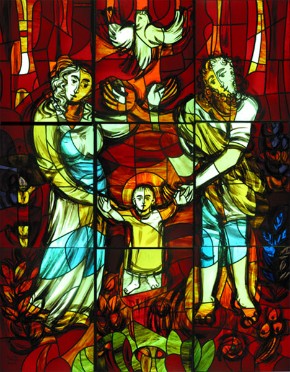God among the imperfect: The holy family didn't meet the ideal either
I don’t know what a perfect first-century family looked like, but I’m certain that Joseph and Mary didn’t fit the ideal. Joseph had no money. He had no safe place for his wife to give birth and no plausible explanation for her pregnancy. How scared they must have been. Their family was turned upside down before it even began.
I know about unusual families. I come from one. There is a picture in one of my mother’s photo albums of the day she and my stepfather were married. They are holding hands and looking pleased but also totally overwhelmed. Each had lost a spouse to cancer only 18 months before. Their kids are on either side of them—six teenagers with mouths stuffed full of braces, heads full of regrettable ’80s hair, each one of them with a dead look in his or her eyes. When I look at that picture and see my biological sister, my adopted sister, three step-siblings whom I didn’t know, my stepfather, my mother and me, I don’t see an ideal family. I see something quite unusual.
Read our latest issue or browse back issues.
But in America “unusual” families are everywhere. In increasing numbers, African Americans marry whites, atheists marry Christians, and men marry men. Democrats marry Republicans. Good single friends join forces as part of the “voluntary kin” movement. We have blended families, same-sex families, adoptive families, and single parent families. That list is from a New York Times article, but it could be straight out of my church directory. Many of the families I serve don’t fit the ideal.
I did see one ideal family recently. They were pictured on a Christmas card that came in the mail. There was a father with a full head of close-cropped black hair, a mother with long blond tresses and an expensive-looking scarf, and four kids of varying ages, each one smiling perfectly, each in a tasteful holiday sweater, eyes peaceful, as if there were no place they’d rather be. All six were set against a holiday backdrop of snow-dusted trees atop a soft, rolling hill. Underneath their photo their name was printed: “The Bronnings.”
I flinched. “Man, the Bronnings are really something. Why can’t we ever get a family photograph that doesn’t feature someone squinting? How did they get all those kids to wear wool sweaters? How big is that backyard?” All of which boiled down to: “Who are these perfect creeps?” I turned the card over. It was an advertisement for Shutterfly, a card and photo company.
The consumer (at least this consumer) often feels inadequate in comparison with the sparkling perfection of holiday advertising. I know Mr. Bronning is fake, but I still don’t compare well . . . Perhaps a professionally shot, classy family Christmas card would help? I mean, maybe it would suggest to the world that my confused, anxious parenting is actually smooth and confident?
Søren Kierkegaard once wrote, “He [man] arrives at the highest pitch of his perfection when he becomes suited to God through becoming absolutely nothing in himself.” As long as I insist that I’m strong, nearly perfect, and able to make my own way, I’ll hold God off at a distance. I don’t need him. He’s just a notion floating in the ether or a comfort arrested in the past. He isn’t someone I desperately need to lean on or collapse into. If I insist that I’m making it on my own, I’ll never become the person I was born to be. My perfection, whether real or as fake as a Christmas card ad, won’t allow God to come into my life.
The Bronnings’ card and others like it try to mask our imperfections and create the fiction of perfect families. But it’s only in accepting the fact that we can’t ever get it right that our families stand a chance of discovering God’s presence, God’s care, God with us.
It’s no coincidence that Christ was born into a shaky, uncertain family. God goes where he’s needed. Joseph and Mary find themselves trembling on December 24, not thumping their sweater-clad chests in a family photo. Joseph and Mary are confused, baffled, needy—and then they find God right in their laps. Right in the middle of their imperfection, as if their imperfection called out to him, “Come, we need you, come be born among us.”
Is your family imperfect? Take heart. So was Christ’s. In his humble family Christ learned to become humble. In his imperfect family Christ learned to become merciful. That’s what we do in our families. We hurt each other and then we forgive one another. Of course, families also introduce us to unearned love, but if it weren’t for forgiveness, families would not be able to exist.
Karl Barth says that at Christmas God remains eternal majesty but also becomes a child, a brother, a family member here, among us. He comes to all of us who’ve ever lived in an imperfect family.
Even if your family managed to muster up the perfect Christmas card this year, you’ll still need God’s presence in your midst. All our families are broken. It may be the lucky families whose “imperfections” won’t let them deny that fact. It is certainly the wise families who embrace it, who name it.
“O come, O come, Emmanuel, into all our holy families.”







